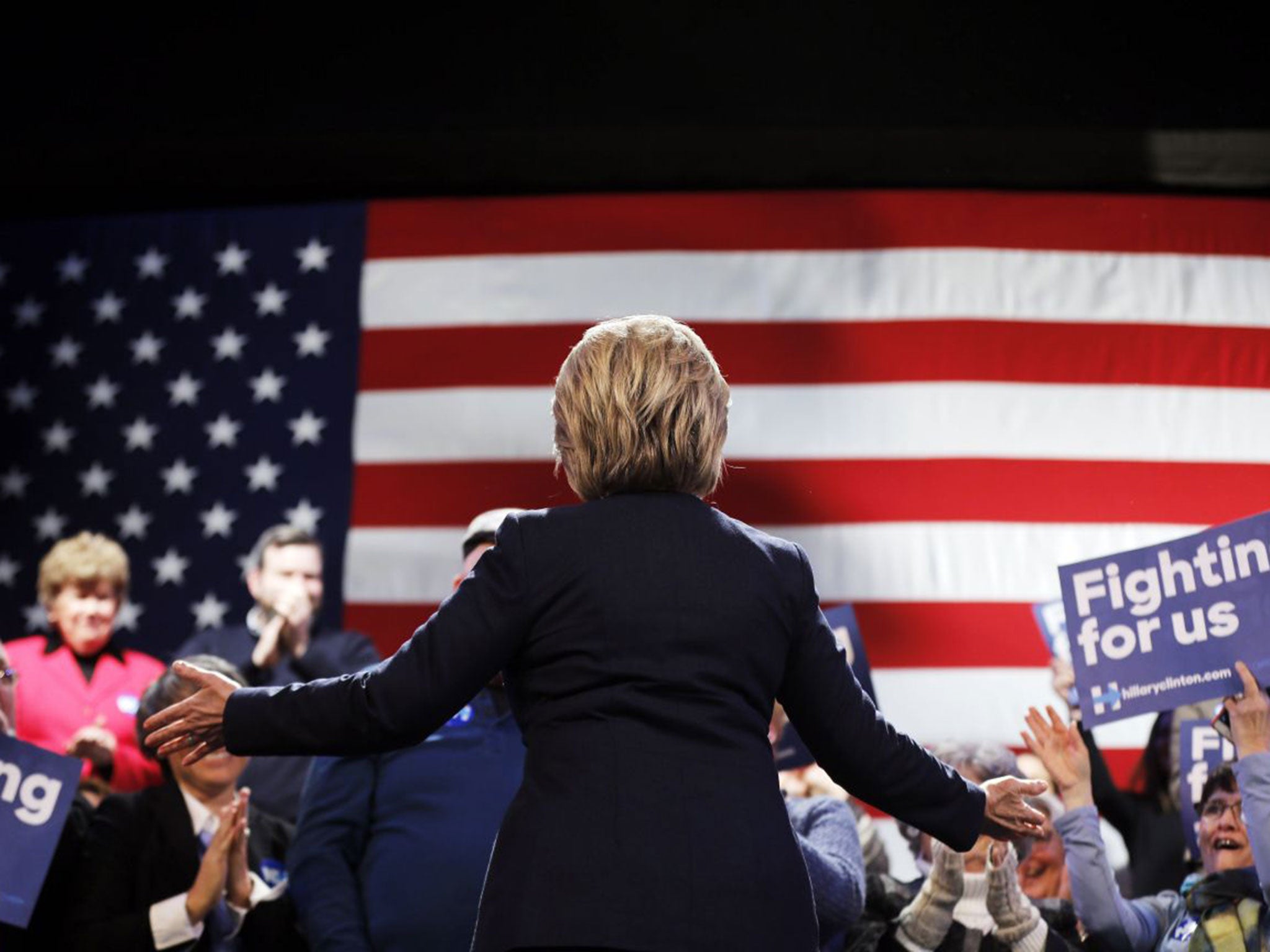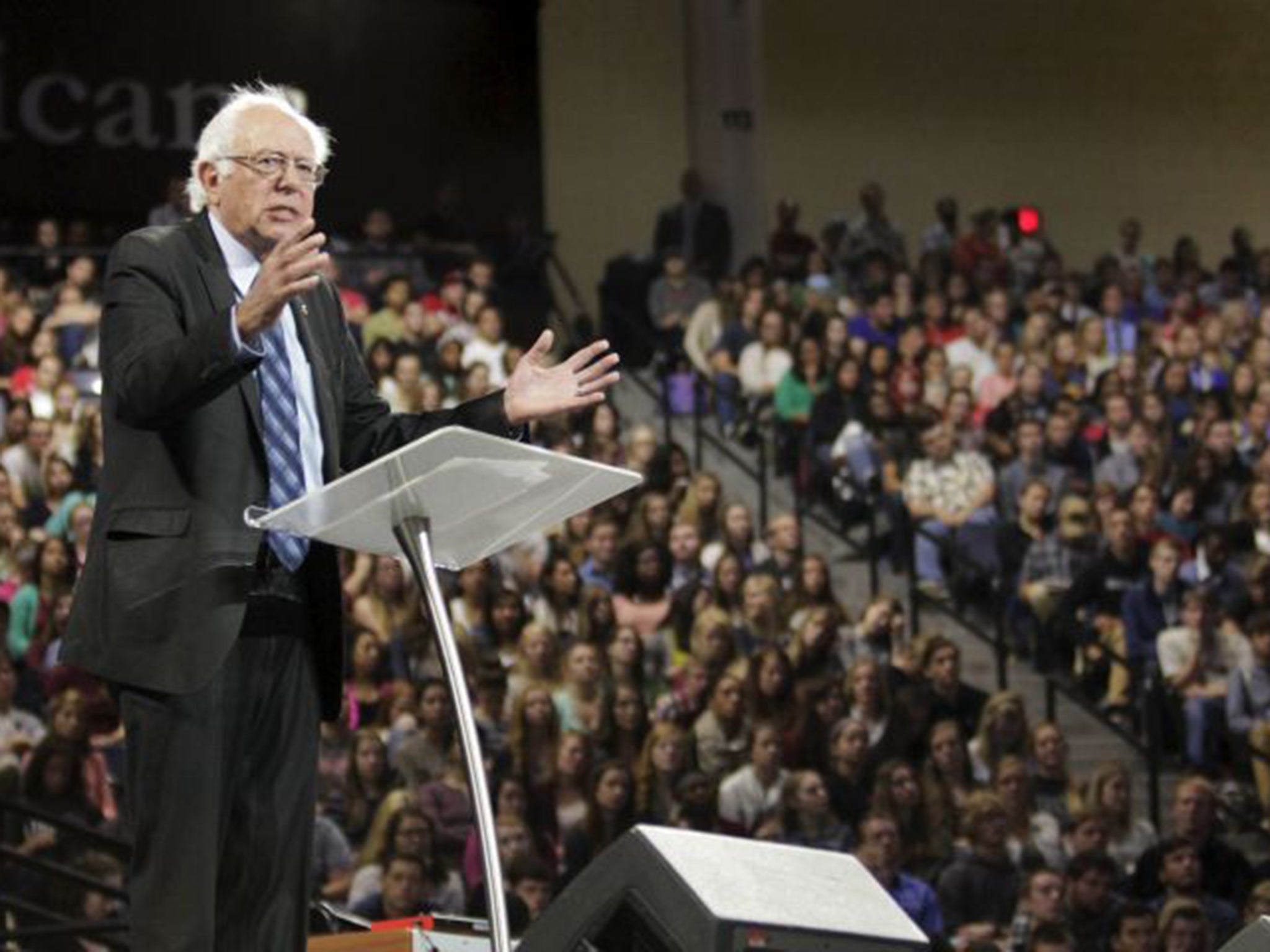US 2016: Bernie Sanders spikes the Clinton juggernaut
The pre-race favourite is, again, facing a serious challenge from a rank outsider – one who can match her dollar for dollar

Your support helps us to tell the story
From reproductive rights to climate change to Big Tech, The Independent is on the ground when the story is developing. Whether it's investigating the financials of Elon Musk's pro-Trump PAC or producing our latest documentary, 'The A Word', which shines a light on the American women fighting for reproductive rights, we know how important it is to parse out the facts from the messaging.
At such a critical moment in US history, we need reporters on the ground. Your donation allows us to keep sending journalists to speak to both sides of the story.
The Independent is trusted by Americans across the entire political spectrum. And unlike many other quality news outlets, we choose not to lock Americans out of our reporting and analysis with paywalls. We believe quality journalism should be available to everyone, paid for by those who can afford it.
Your support makes all the difference.Could it happen again? It was dreadful but just about bearable last time, losing to a young guy who caught the zeitgeist and spoke like an angel. But losing to a septuagenarian self-avowed socialist, who resembles an Old Testament prophet in need of a new tie – and in America of all places? If there is a God up there, please, please not.
Such must be the thoughts of Hillary Clinton this weekend, as she contemplates the presidential race. In 2008, she started off as clear favourite in a strong Democratic field, only to be reeled in by one Barack Obama. In 2016, on paper at least, she faces far less imposing opposition and started off as favourite.
And yet, eight days before the Iowa caucuses that kick off the primary season, here we go again. Bernie Sanders, a senator from Vermont and the socialist in question, has pulled level in Iowa according to the polls, and is clearly ahead in New Hampshire, which votes a week later. Astonishingly, he’s even matching the Clinton fundraising juggernaut virtually dollar for dollar.
True, Clinton still has a solid lead nationally, but defeat in those first two states could transform the dynamic. A measure of her anxiety is that she is now going after him in person. Once, even in television debates, she barely acknowledged his existence. No longer.
His ideas – universal single-payer healthcare, free college tuition and soak-the-rich taxes – are noble but utterly impractical, she argues. Were Sanders the party’s nominee, the Republican attack machine would have this self-appointed scourge of capitalism for breakfast.
Alas, the new tactics don’t seem to be working. Sanders, with a considerable helping hand from developments in the real world, has made socialism almost respectable. “Would you be willing to vote for a socialist?” the pollster Frank Luntz asked last June, when people hardly knew who Sanders was. Yes, replied nearly 60 per cent of Democrats surveyed and – astonishingly – 29 per cent of Republicans. Those proportions are surely greater now.

If anyone’s caught the zeitgeist, it’s Sanders, with his message of a system rigged to favour the rich, at a time when real wages are stagnating, America’s relatively solid economic recovery doesn’t feel like one and the gap between the super-wealthy and the rest has reached levels not seen since the Gilded Age.
Against that set Hillary, she of the $250,000 speaking fees at Goldman Sachs. Sanders’s money comes from small donors. Hillary gets such payments – equivalent to what an average American makes in five years – for a couple of hours with mega-donors. Is there not a conflict of interest, Sanders asks, when she promises to crack down on those Wall Street firms who have bestowed such largesse upon her, her husband and the family philanthropic foundation?
Hillary of course rejects the charges, trotting out her plan to tighten regulations on big banks and financial operators. To get things done, she insists, you must work with Wall Street, not demonise it. But in the heat of a primary season, when hearts tend to rule heads, such arguments have limited appeal.
And one problem leads to another. She’s never been a good campaigner, not a patch on Bill, with his ability to fake authenticity. Hillary still comes across as calculating and opportunistic, ready to say anything to win votes. Speaking of Bill, there’s the small matter of those women – Monica Lewinsky et al. They are old news, but at a moment when the issue of sexual aggression is front and centre for America’s women’s movements, Hillary’s dismissals of such claims against her husband do not sit well.
The claims, moreover, are a trip back to the past, reminding Americans that the Clintons have been around for ever. Presidential elections are about the future; but Hillary and Bill feel like the 1990s. A prosperous and relatively untroubled past to be sure, but the past nonetheless.
Finally, there are the emails – not what they might reveal about the Benghazi affair, but the FBI investigation of whether Hillary broke the law by using a private server to handle classified information. It’s hard to imagine charges will be brought. But if they ever were, then goodbye Hillary and, presumably, welcome back Joe Biden. Do not, however, confuse the Clinton-Sanders struggle with the existential, Trump-fuelled mayhem on the Republican side. This Democratic battle is a classic of politics: between the establishment candidate and the outsider, the incrementalist and the idealist, the pragmatist and the revolutionary.
Consider their respective TV ads: Sanders – who leads by almost two to one among voters under 25 – last week released a wordless, almost dreamlike spot featuring a smiling Bernie and overflowing rallies against a backdrop of Simon & Garfunkel’s “America”. Clinton’s ads stress her experience, her plans and her mastery of the issues, foreign and domestic.
We’ve been here before. Sometimes the outsider wins, as did George McGovern in 1972 and, one might argue, Obama eight years ago. More often they give their opponent a nasty scare before losing: take Eugene McCarthy in 1968, Gary Hart in 1984, Bill Bradley in 2000 and Howard Dean in 2004.
I still go with the conventional wisdom that Hillary will win. Once the race moves beyond Iowa and New Hampshire to bigger states, her strengths among minorities and women should come through. She has an overwhelming edge in endorsements and among the so-called “superdelegates” who will be attending the Philadelphia convention in July.
But it won’t be quick. “Nobody ever stops running for president, they just run out of money,” a former Democratic senator noted the other day. “And Bernie has enough money for a long time.”
Join our commenting forum
Join thought-provoking conversations, follow other Independent readers and see their replies
Comments